|

|
|
|
Vienna Climate Change Talks 2007
AWG4 and the Dialogue 4
27-31 August 2007 | Vienna, Austria
|
|
Highlights from Tuesday, 28 August 2007
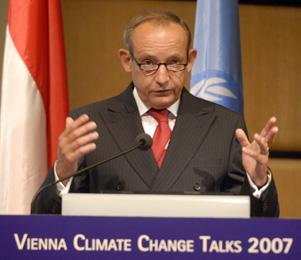
On Tuesday, the fourth Convention Dialogue workshop convened in plenary all day focusing on finance issues and their relation to an appropriate and effective international response to climate change. During the morning session, participants heard presentations on a report by the Secretariat on investment and financial flows, followed by questions and a panel discussion. In the afternoon, the workshop continued with an exchange of views among panel members, government representatives and civil society. UNFCCC Executive Secretary Yvo de Boer introduced the report on finance and investment |
|
|
| Convention Dialogue: finance issues and their relation to the development of an appropriate and effective international response to climate change |
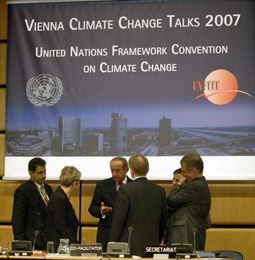
|
| Dialogue Co-Facilitator Howard Bamsey explained that the focus of the day's discussions would be on a report requested by COP 12 from the Secretariat on investment and financial flows to address climate change. |
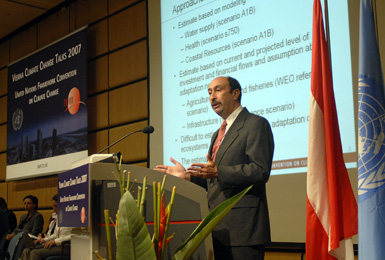 |
|
Joel Smith, Stratus Consulting (left), estimated that a total of USD 50-170 billion of additional investment and financial flows will be needed for adaptation by 2030, highlighting that damages caused by climate change were not included in the estimate and that the numbers would also depend on the amount of climate change. He predicted that the cost of adaptation would rise substantially during the coming century. UNFCCC Executive Secretary Yvo de Boer (right) underscored the broad consultative process underlying the report and said its main findings concerned financial and investment flows needed in 2030 to meet worldwide mitigation and adaptation requirements. He explained that mitigation in developing countries is less expensive and that the carbon market would have the potential to deliver more emission reductions and investment flows, but the demand depends on the emission reduction ambitions of industrialized countries.
|
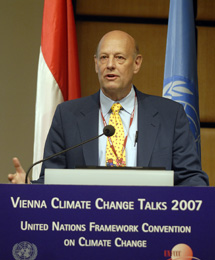 |
|
| Erik Haites,
Margaree Consulting, emphasized the difficulty of estimating the costs of reducing deforestation and sources of financing based on current flows that are largely private. He estimated that most investment would come from the private sector, with incentives and policies. |
Mohamed Al-Sabban, Saudi Arabia (left) questioned the inclusion of nuclear energy in the report given that it is not environmentally acceptable to many parties, and advocated clean oil use. Taha Balafrej, Morocco (right), mentioned hydro-energy and reduced water supply as an example of the overlap between mitigation and adaptation financing.
|
| Panel discussion focusing on what the findings imply for the development of an appropriate international response to address climate change |
| Ian Burton, independent expert, James Cameron, Climate Change Market, and Ian Noble, World Bank |
|
Ernest Rauch, Munich Re (left), spoke on efforts by insurers in private and public-private partnerships using micro-insurance, catastrophe bonds, their role in capital markets and a goal by the head office to be carbon neutral by 2009. On the main constraints on mobilizing new capital investment, Richard Samans, World Economic Forum (center), proposed that finance and economic ministries would have to work through such issues with delegations; described the extraordinary potential of the carbon market while cautioning that uncertainty can be a fatal impediment; and described the critical role of domestic regulatory environments for investment. |
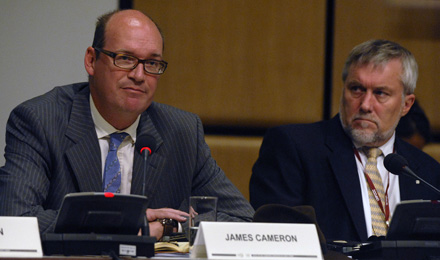 |
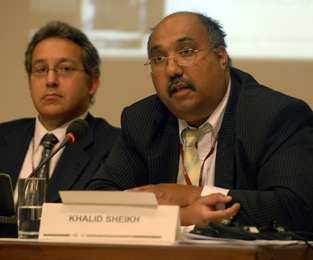 |
James Cameron, Climate Change Capital (left), described the challenge of constructing the new legal framework within which capital will flow to address climate change, and aligning public, moral and private interests and purposes. He defended the moral case for moving capital, through a carbon mechanism, to countries that have played a small role in creating the problem; and warned against trading off real reduction targets, the carbon market and technology transfer. Khaled Sheikh, ABN/AMRO (right), addressed the role governments can play to support financial actors, highlighting the importance of risk, capital ratios, and capital and financial institutions, citing the examples of the Equator Principles in helping to translate policy into tangibles, and Catastrophic Bonds. |
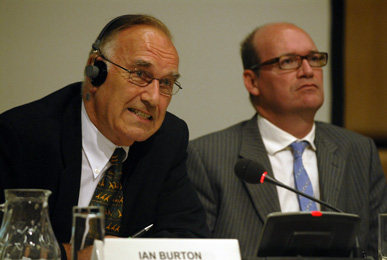 |
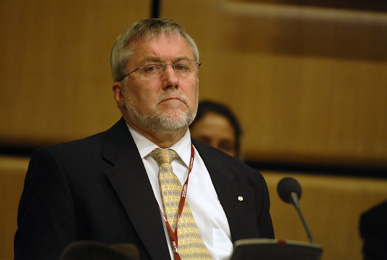 |
Ian Burton, independent expert (left), emphasized that adaptation can mean many different things and requires various kinds of expertise, thus making it a bigger and more complex building block for the post-2012 regime than currently conceived. Ian Noble, World Bank (right), spoke of the large shortfall between current and needed financial flows, described the Bank's interest in adaptation, and said developing countries must recognize that they are the main players in the process. |
Norway (left) stressed the importance of setting the emissions cap at the right level for the carbon market and that investors internalize the carbon price. Venezuela (right) cautioned that the challenge for developed countries is to change the market-driven system of consumption and production in favor of a humanistic model of development. |
| Philip Pearson, International Trade Union Confederation (left), called on decision-makers to show the link between investment flows and employment. He called for new instruments to ensure developed countries bear the burden of climate change costs. Thomas Becker, speaking for the EU (right), stressed that as mitigation can provide net benefits, including in the power sector, the challenge is not so much technical or economic but political and institutional. He emphasized the role of the carbon market and said deeper commitments from developed countries are required to deliver its potential. |
| Press Briefing on Finance and Investment |
| Maria Netto, UNFCCC Secretariat (left), and UNFCCC Executive Secretary Yvo de Boer (right) |
- ENB coverage of the
UN General Assembly's Informal Thematic Debate,
31 July–2 August 2007, New York
- ENB coverage of SB26,
7-18 May 2007, Bonn, Germany
-
ENB coverage of COP12,
6-17 November 2006, Nairobi, Kenya
-
IPCC Working Group 3 and IPCC-26, 30 April-4 May 2007, Bangkok, Thailand
-
UNFCCC Asian Regional Workshop on Adaptation, 11-13 April 2007, Beijing, China
-
IPCC Working Group 2, 2-5 April 2007, Brussels, Belgium
-
CTI Joint Seminar on Technology Transfer in Asia, 7-8 March 2007, New Delhi, India
-
Community Based Adaptation to Climate Change, 24-28 February 2007, Dhaka, Bangladesh
-
IPCC Working Group 1, 29 January-1 February 2007, Paris, France
-
Linkages climate and atmosphere page
- Linkages Update
-
MEA-L
- Multilateral Environmental Agreements Listserve
-
Climate-L - Climate Change Policy Issues and Announcement
Listserve
-
African Regional Coverage
|
 Please e-mail the Digital Editor should you have any questions regarding the content of this page. Please e-mail the Digital Editor should you have any questions regarding the content of this page.
|
|